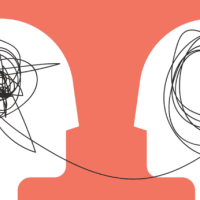
Q: As a new therapist, I would like to have some advice on how to deal with issues faced by couples. it has been a challenge for me and I don't know how I could really help them. Especially when they start fighting and non-stop arguing right in front of my eyes, or one lashes out the door in anger.
A: I am happy to hear that you have the desire to challenge couples therapy, because it is not easy. If you find that you are not helping them, then perhaps it is better that you get some training on couple's therapy and to have at least about 3, 4 years of experience before you actually see couples.
I am saying this from ethical point of view because if you are not confident in knowing how to help the clients, you will not be able to help them.
But let me tell you what I keep in mind when I have couples.
First, I lay out some ground rules, such as no yelling or lashing anger towards each other. (I teach them de-escalation technique, deep breathing, meditation, and anger management, emotional regulation), you give the other person chance to speak and the other one to listen (I teach speaker, listener skills), no physical fights, no leaving the room (I teach time out if they are too upset)
1. Assess
Initial assessment is very important. I usually feel I need at least 2 to 3 sessions to find out the kind of pattern that the couple relate to each other. You will need keen observation to see how they communicate with each other. Are there problematic areas of communication? When issues arise, how do they solve them? How do they share joint responsibilities, especially around the house and raising children? Are there issues that is not solvable, like underlying issues?
Since I mainly take inter-racial and inter-cultural couples, I have developed a keen eye on observing the cultural differences, which includes communication style, as well as differences in values they each hold.
Most of the time, the couples are not aware of the issues they have. They certainly know the symptoms that they have, such as "we fight all the time" or "he always gets his way" or "he never helps me around the house"
I also ask what their goals are. If one wants to continue with the relationship and wants to work on it, but the other is almost ready to go out the door, it is difficult for them to work on improving the relationship. Couple's therapy I believe starts from which direction they both want to head towards. That needs to be clear.
2. Team mind-set
When they are in conflict, one try to win over the other, wanting to have their way. So many therapists will think that they need to help the individual rather than help them to see things from the lens of "we are a team". So often my question is, "how can you solve this issue as a team rather than trying to fix the other person for the problem?" When couples are in conflict, they tend to think that "he/she has the problem, and he/she needs to change". However, I like to pose the question, "How can you both work towards the goal?"
This approach is taken also when it comes to raising or disciplining children. I ask "What would be the best interest for your child?" rather than taking the approach of one needing to do their part because the other partner points out that the other partner is not doing what he or she is supposed to do.
Family is a unit. You cannot separate one individual responsible for half the work. You both need to come together as a team and with that mind-set, you solve the issues.
3. unresolved issues
Often times I see the underlying issues, the core issue, or the deep down hiding issues in the pattern of communication. So they are arguing over "you didn't take the trash out", but the underlying issue maybe, "I want your love and attention". I know this is not easy to understand, but she/he might be saying her needs and wants through the surface symptoms, which I call "complaints" or "what irritates me".
In such case, I find it to be most effective, if he/she can deal with the issue in a separate session. She/he may need to see a therapist individually. These core issues can be deeply ingrained from the past, or something that even goes back to their childhood. For example, "why am I so needy?" "where is my insecurity coming from"? These things cannot be dealt with in couple's therapy.
4. no such thing as "one size fits all"
We need to be very careful and to know that each couple is unique. Although for the past 2 decades I have been specialized in treating international marriages, inter-racial couples, inter-cultural couples, I am very aware that each couple is unique and I must never categorize them. Because once you categorize them and put labels to them to say "oh, this case sound familiar" then you are heading towards a different direction, which becomes your agenda. Every case is unique and different and you have to approach with fresh eyes as if you know nothing about them.
There are many interventions out there, such as behavioral therapy, cognitive behavioral therapy, emotionally focused therapy, integrative behavioral therapy, time-outs, meditation, emotional regulation, "I" statement, etc. and I have noticed young inexperienced therapists try to introduce couple's to follow certain curriculums. Yes, it is easy to give them workbooks to follow, however, most often, couple's issues are complex and complicated. You may present tools, however, it's another question whether they can apply it to their daily lives. You need to create many opportunities to actually practice and exercise the skills you have taught them. I do lots of role plays, where they will review how they can effectively communicate so that their partner understands what he or she had heard.
There are more to these above tips, but since space is limited, I will stop here for now.
I also suggest peer consultation, where you will learn from each other, and bring up issues that you are facing, and to hear how others had dealt with the situation.
Good luck.
(picture from Shutterstock)
A: I am happy to hear that you have the desire to challenge couples therapy, because it is not easy. If you find that you are not helping them, then perhaps it is better that you get some training on couple's therapy and to have at least about 3, 4 years of experience before you actually see couples.
I am saying this from ethical point of view because if you are not confident in knowing how to help the clients, you will not be able to help them.
But let me tell you what I keep in mind when I have couples.
First, I lay out some ground rules, such as no yelling or lashing anger towards each other. (I teach them de-escalation technique, deep breathing, meditation, and anger management, emotional regulation), you give the other person chance to speak and the other one to listen (I teach speaker, listener skills), no physical fights, no leaving the room (I teach time out if they are too upset)
1. Assess
Initial assessment is very important. I usually feel I need at least 2 to 3 sessions to find out the kind of pattern that the couple relate to each other. You will need keen observation to see how they communicate with each other. Are there problematic areas of communication? When issues arise, how do they solve them? How do they share joint responsibilities, especially around the house and raising children? Are there issues that is not solvable, like underlying issues?
Since I mainly take inter-racial and inter-cultural couples, I have developed a keen eye on observing the cultural differences, which includes communication style, as well as differences in values they each hold.
Most of the time, the couples are not aware of the issues they have. They certainly know the symptoms that they have, such as "we fight all the time" or "he always gets his way" or "he never helps me around the house"
I also ask what their goals are. If one wants to continue with the relationship and wants to work on it, but the other is almost ready to go out the door, it is difficult for them to work on improving the relationship. Couple's therapy I believe starts from which direction they both want to head towards. That needs to be clear.
2. Team mind-set
When they are in conflict, one try to win over the other, wanting to have their way. So many therapists will think that they need to help the individual rather than help them to see things from the lens of "we are a team". So often my question is, "how can you solve this issue as a team rather than trying to fix the other person for the problem?" When couples are in conflict, they tend to think that "he/she has the problem, and he/she needs to change". However, I like to pose the question, "How can you both work towards the goal?"
This approach is taken also when it comes to raising or disciplining children. I ask "What would be the best interest for your child?" rather than taking the approach of one needing to do their part because the other partner points out that the other partner is not doing what he or she is supposed to do.
Family is a unit. You cannot separate one individual responsible for half the work. You both need to come together as a team and with that mind-set, you solve the issues.
3. unresolved issues
Often times I see the underlying issues, the core issue, or the deep down hiding issues in the pattern of communication. So they are arguing over "you didn't take the trash out", but the underlying issue maybe, "I want your love and attention". I know this is not easy to understand, but she/he might be saying her needs and wants through the surface symptoms, which I call "complaints" or "what irritates me".
In such case, I find it to be most effective, if he/she can deal with the issue in a separate session. She/he may need to see a therapist individually. These core issues can be deeply ingrained from the past, or something that even goes back to their childhood. For example, "why am I so needy?" "where is my insecurity coming from"? These things cannot be dealt with in couple's therapy.
4. no such thing as "one size fits all"
We need to be very careful and to know that each couple is unique. Although for the past 2 decades I have been specialized in treating international marriages, inter-racial couples, inter-cultural couples, I am very aware that each couple is unique and I must never categorize them. Because once you categorize them and put labels to them to say "oh, this case sound familiar" then you are heading towards a different direction, which becomes your agenda. Every case is unique and different and you have to approach with fresh eyes as if you know nothing about them.
There are many interventions out there, such as behavioral therapy, cognitive behavioral therapy, emotionally focused therapy, integrative behavioral therapy, time-outs, meditation, emotional regulation, "I" statement, etc. and I have noticed young inexperienced therapists try to introduce couple's to follow certain curriculums. Yes, it is easy to give them workbooks to follow, however, most often, couple's issues are complex and complicated. You may present tools, however, it's another question whether they can apply it to their daily lives. You need to create many opportunities to actually practice and exercise the skills you have taught them. I do lots of role plays, where they will review how they can effectively communicate so that their partner understands what he or she had heard.
There are more to these above tips, but since space is limited, I will stop here for now.
I also suggest peer consultation, where you will learn from each other, and bring up issues that you are facing, and to hear how others had dealt with the situation.
Good luck.
(picture from Shutterstock)

























